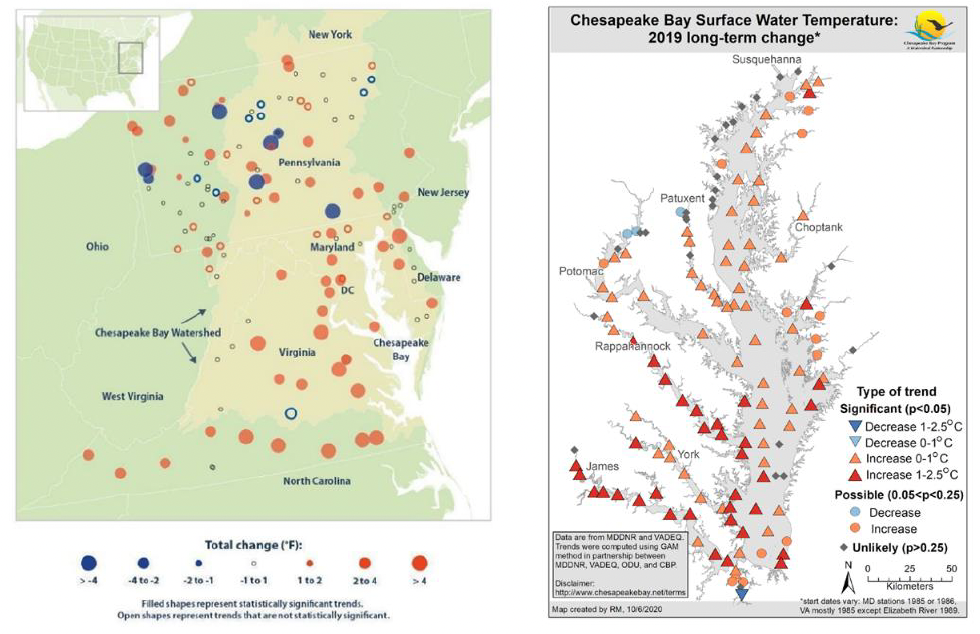Day 2: Rising Watershed and Bay Water Temperatures—Ecological Implications and Management Responses
March 15, 2022 - March 15, 2022For a summary of report takeaways, please see the 8-page report below, drafted in partnership with UMCES.
The report is available for download in the following forms:
- Report and Appendices (505 pages)
- Report and Synthesis Papers (261 pages)
- Report only (60 pages)
- Appendices only (446 pages)
Agenda: STAC Rising Temps Agenda Day 2
Briefing Materials:
Water temperature increases are occurring in Chesapeake Bay tidal waters and in streams and rivers across the Bay’s watershed and are expected to continue. Rising water temperatures have significant ecological implications for Bay and watershed natural resources and could undermine progress toward Chesapeake Bay Program (CBP) Partnership goals for fisheries management, habitat restoration, water quality improvements, and protecting healthy watersheds. There is a critical need for insights into what the CBP Partnership might do now–within the scope of its current goals, policies and programs–to actively prevent, mitigate or adapt to some of the adverse consequences.
The Chesapeake Bay Program’s Scientific and Technical Advisory Committee (STAC) invites you to participate in the second and concluding one-day virtual workshop. The day will be focused on: 1) identifying and prioritizing near-term actionable management recommendations for the Bay Program partnership on options to address rising water temperatures effects on habitats and living resources and 2) identifying and prioritizing scientific information needs, including research, analyses, monitoring, and modeling, to enable the partners to take additional actions in the future.
To address these issues the Chesapeake Bay Program’s Scientific and Technical Advisory Committee (STAC) is conducting a two-part workshop to document the impacts, identify science gaps and develop management recommendations. The first part was held in January 2022. It focused on building a picture of interrelationships between the causes of increasing water temperatures and the resultant ecological impacts. It assessed the relative certainty of the available information to support decision-making, and identified a range of management implications.
Workshop day 1 in January 2022 focused on building a picture of interrelationships between the causes of increasing water temperature and the resultant ecological impacts. It assessed the relative certainty of the available information to support decision-making, and identified a range of management implications. In preparation for the second workshop day, participants will receive a summary of findings from day 1, identified management implications for discussion, and, where available, examples for the types of actionable recommendations which might emerge from the second day’s discussions.
Presentations:
- Session 1: Coldwater Fisheries and Habitats – Lead: Frank Borsuk (EPA), Dan Goetz (MD DNR)
- Session 2: Rural Waters and Habitats – Lead: Matt Ehrhart (Stroud)
- Session 3: Urban Waters and Habitats – Lead: Jeremy Hanson (CRC)
- Session 4: Cross-watershed Topics – Scott Phillips (USGS), Gary Shenk (USGS)
- Water Quality Standards – Rebecca Hanmer (Retired-EPA)

Figure 1. Left. Changes in Stream Water Temperatures in the Chesapeake Bay Region, 1960–2014. Data source: Jastram and Rice, 2015. <https://www.epa.gov/climate-indicators/climate-change-indicators-stream-temperature> Figure 2. Right. Long term flow-adjusted trends in bottom water temperatures at the Chesapeake Bay Mainstem and Tidal Tributary Water Quality Monitoring Program stations through 2019 from the Integrated Trends Analysis Team (ITAT). <https://www.chesapeakebay.net/who/group/integrated-trends-analysis-team>
